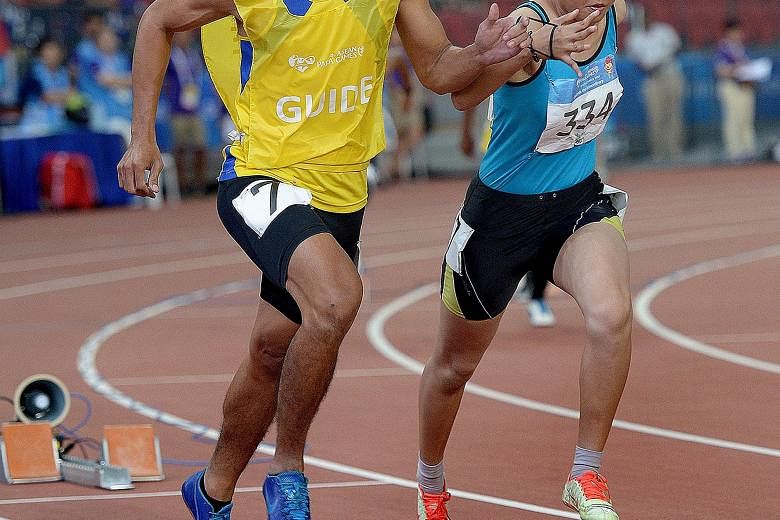First, the feet are positioned carefully on the starting blocks by Vietnam's Nguyen Tan Phat. Then the hands are placed meticulously on the starting line.
But they are not his feet or hands.
Phat is the running guide for visually impaired compatriot Nguyen Thi Nhan, 26, in the T11 400m final at the Asean Para Games on Dec 8.
Runner and guide, having trained together for three years, are connected by a single elasticised black band around their wrists. As the race starts, the pair burst out of the blocks and run in harmony, never separated by more than 10cm.
Perfect synchronisation is paramount for Phat, 23. Even if he crosses the line a split-second before Nhan, she faces instant disqualification.
He initially took on the role as a running guide for Nhan and two other athletes after he saw the physical difficulties they faced.
He told The Straits Times: "I volunteered to help because I wanted to help my country in whatever way I can."
During Nhan's T11 400m final, as they prepare to negotiate each bend, Phat gives her a single-word command so that she leans into the turn with him.
In the final stretch, he encourages her as they bear down on the finish line.
But the guide's job does not end there. When Nhan wins a silver medal in the event, a proud Phat stands alongside her on the podium during the victory ceremony.
Empathy is his only reward. "When the athletes receive medals, it almost feels like I'm receiving them as well. I share their feelings, regardless of whether they're happy or sad."
Yet while Phat is an active participant in the race, things are different for Singapore boccia assistant Nurulsyahirah Taha, 29. She must sit on the court near her sister Nurulasyiqah Taha, but with her own back to the action.
She must respond in silence to instructions from her sibling, marginally adjusting the direction and height of the ramp before positioning the ball for her sister to knock it down.
"It is your attitude that counts as an assistant," she said. "You do whatever the athlete tells you to do, because you are their arms and legs."
She is on edge at times, her eyes trying to read the expression on her sister's face. "I have to learn to manage my own emotions during a game."
Sya is also Nurul's caregiver during competitions, showering her and dressing her. "I feel happy," she said, "that I can help my sister and that the work I do is meaningful. I also get to spend time with her and give her moral support as a sister."
Echoing that commitment on the sidelines of the futsal pitch is 59-year-old Singapore coach Richard Tan, who doubles as the eyes of the visually impaired football five-a-side team.
He shouts familiar directions to players who trust his commands implicitly."Half-right", "half-left" and "right turn" are drilled into the team during training to ensure that players are familiar with the commands during matches.
Tan said: "You must have a lot of patience and understand where they are coming from. It's so easy to ask them to chase the ball, but sometimes you forget the fact they are visually impaired."
Despite the pressure, he exudes patience. On the pitch, he cuts a figure of calm, arms folded, as he directs his players.
But not all intervention is permitted. During the 0-5 loss to Thailand on Dec 6, he ran onto the pitch to reposition a player who had lost his bearings, much to the ire of the referee who immediately cautioned him.
Tan, who formed the team three months ago, said of his players: "I'm inspired by their resilience and perseverance. Sometimes there are last-minute changes in training venues, yet they find their way via public transport and always turn up on time.
"They always play their hearts out - there's nothing more that a coach can ask for."
Although the Games have come to a close, the work of these invisible participants continues. For Phat, there is no end game, no plan to quit. He simply states: "I'll never stop as long as I can run. I believe my contribution can make a big difference."
To Nhan, Phat is much more than just a running guide; he is pivotal to her longevity as a competitor. "When I'm on the track with him," she explained, "I feel confident. I trust in him completely. I'm never scared of falling down."

